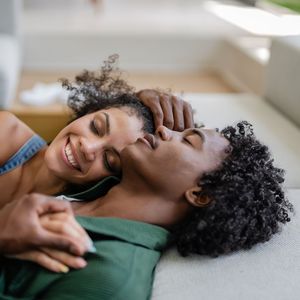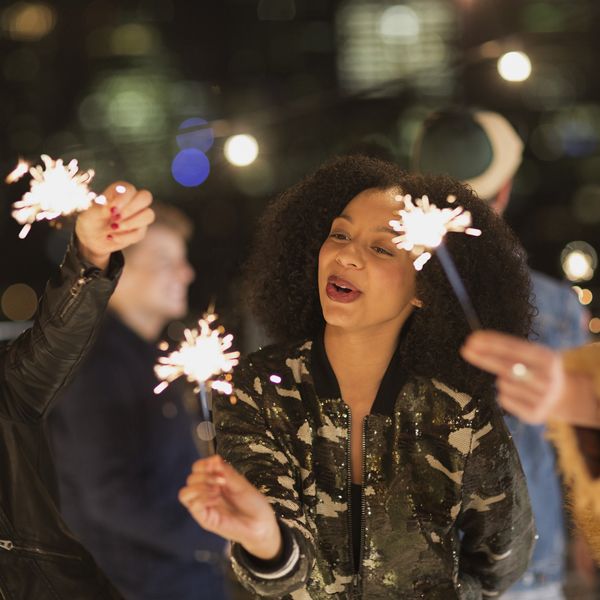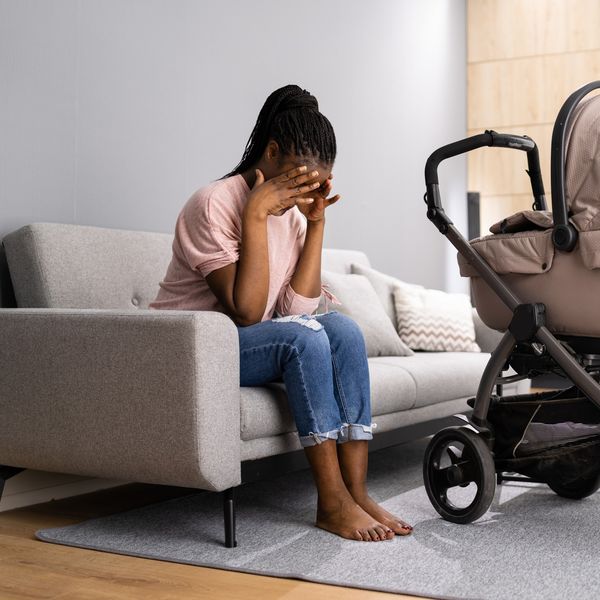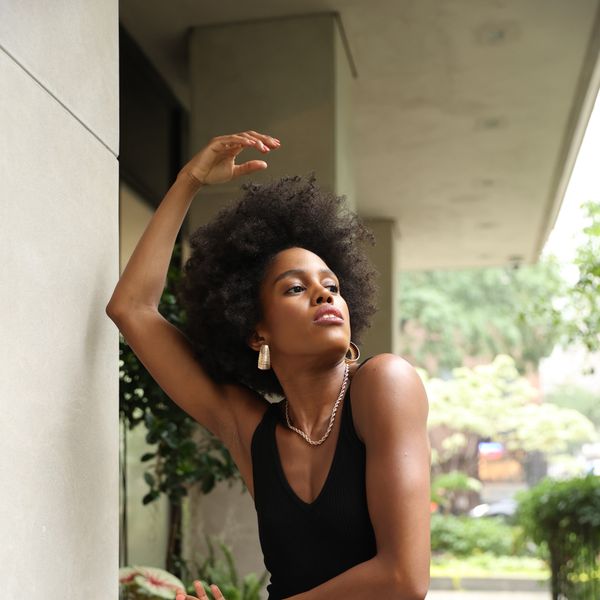
What a year will do, right? This time last year, we had a crazy man for a POTUS while we were just settling into the reality that the pandemic known as COVID-19 was going to change our lives in a very real way. Well, if you're reading this, pat yourself on the back because your resilience caused you to survive both. And now, here we are—a new president and, as of the time of this going to press, three vaccines being available in order to get us back to some sense of normalcy.
If you know that getting a COVID-19 vaccine is probably the best thing to do yet you're still curious about how it will ultimately benefit you, there are three main reported reasons. First, you can start to meet up with other vaccinated individuals without the need for social distancing or wearing a mask (imagine that!). Two, you can travel domestically without the need for testing or quarantining. And finally, you can also feel more confident about spending time around unvaccinated individuals. Basically, you can start seeing your peeps and enjoying having some sort of a social life again.
If that feels good to you yet you've still got a few questions about it all, I get that. After all, these types of vaccines are still new and things are ever-changing. That's why I wanted to do you a solid and provide you with 10 tips to get you physically—and somewhat mentally and emotionally—prepared for your vaccination—so that with a new sense of freedom, you can also have peace of mind.
1. Research the Different Vaccines First
Whew, y'all. It was March 16, 2020 when I wrote "Before You Freak Out: 12 Things To Know About The Coronavirus". A little over a year—and a mind-boggling 554,000 COVID-related deaths—later, we are now at the point where a vaccine is available so that our bodies can begin to develop an immunity to the virus. However, before making an appointment to get vaccinated, it's important that you know as much as possible about the three different kinds that are currently available. There's Moderna. There's Pfizer-BioNTech. And there's Johnson and Johnson's Janssen.
As far as choosing which one is personally best for you, as it stands at the time that I'm writing this, Pfizer-BioNTech is 95 percent effective, Moderna is 94 percent and Johnson and Johnson's Janssen is 66 percent effective (according to CDC clinical trials; it's 85 according to the FDA) at preventing the virus. (As of 4/13/21, Johnson and Johnson has been paused due to six people getting blood clots from the virus.)
Still, you may want to check with your doctor for their insight on which vaccine they feel is actually best for you (by the way, each vaccine is hyperlinked to detailed data about each one of them).
2. Hit Up VaccineFinder.org (or Check with Your Local Pharmacy)
Probably one of the most common questions when it comes to getting vaccinated is where do you go in your local area to get your shot? A website that's pretty helpful is VaccineFinder.org. If you go to its page, it'll ask for your zip code. Then it will provide you a list of different places that are administering the vaccines, along with which brands are available at each location and who currently qualifies for what. Another option is to hit up your local favorite pharmacy to see if they are administering the vaccine of your choice. If they aren't, they should be able to tell you if another one of their pharmacies is. (For the record, you can check with your local health department for this kind of info too.)
3. Boost Your Immunity a Week Beforehand to Getting the Vaccine
It probably comes as no surprise to you that the better state your immune system is in, the more you decrease your chances of experiencing the worst kind of side effects from your vaccination. Some medical experts recommend being intentional about boosting your immunity approximately seven days prior to your first dose of the vaccine and maintaining whatever regimen you created for seven days after as well. If you'd like some quick tips on how to do that, check out "Ready To Try 10 Quick & Easy Immune-Boosting Hacks?" Also, make sure to take a probiotic (it helps to bring "good bacteria" to your gut which is where 80 percent of your immune system resides), to take some zinc and/or eat foods that are high in zinc (it builds up immunity) like hemp or flaxseeds, meat, cashews, eggs and wholegrains, and to get some (extra) amino acids (they assist with fueling your immune system) into your body with the help of turkey, mushrooms, quinoa and fish. And what if exercise is your way of keeping your immune system on-point? That's all good. Just avoid working out two hours prior and following your shot(s). Oh, and try and avoid taking a hot shower during that same period of time (two hours). Some folks have said they had an allergic reaction to their vaccination when they did immediately following it.
4. Mentally Prepare for Possible Side Effects from the Vaccine
The overall purpose of a vaccine is to stimulate your immunity to produce antibodies in a way like you already had the disease. However, this does not mean that getting a vaccine will give you, in this case, COVID-19. That's because none of the vaccine brands that are currently available actually contain the live virus within it.
That said, it's not uncommon to experience some side effects, whether it's after the first or second shot (it seems to be more common with the second shot)—or with both. And what are some of those side effects?
- Pain or swelling where the shot was administered
- Muscle and/or joint pain
- Fever
- Fatigue
- Chills
- Nausea
- Swollen lymph nodes
And when does all of this typically go down? On average, around day three after getting vaccinated. That's the bad news. The good news is the symptoms typically subside within 1-2 days after they first kick in. The other good news is it's not a given that you will have some. Still, it's important that you get to know as much about the vaccination process as possible. Also, the person who gives you the shot doesn't typically administer it and immediately send you on your way. They will require you to stay close by for 15-20 minutes, just so they can see if you have an immediate reaction to the shot or not.
5. Avoid Taking Over-the-Counter Meds 48 Hours Prior To
After reading about the potential side effects that you could experience, you might think, "No problem. I'll just take some ibuprofen to head them all off." While that might seem logical, it's actually not the best idea. The reality is, there's just not enough medical data (yet) to reveal what could happen if you did that. On one hand, you might be fine. On another, over-the-counter meds could mess around and throw the immune response of the vaccine way off. So, just to be on the safe side, avoid those medications altogether. Now that I'm thinking about it, this is a stellar reason to not book your vaccination appointment around your period either. Not only are you probably going to feel pretty icky going in but if you rely on Advil, Tylenol, etc. to get you through your discomfort, because of everything that I just said, it's wise to get your vaccine when your cycle is not an issue.
6. Go Easy on Your Allergy Medications
As far as allergies go, being that this is peak allergy season, let me touch on a couple of things. First, so long as you don't have a history of having an allergic reaction to vaccinations or any form of injectable medications, you should be able to get the vaccine. On the other hand, if you do, that is something that you should definitely discuss with your doctor before making your vaccine appointment (you can also get vaccinated if you have an existing health condition, so long as you run that past your physician first too).
And what if you currently take some type of antihistamine or other allergy med? Since there've been some reports of severe allergic reactions to the vaccine brands, you might think that you're protecting yourself by taking your allergy medication before getting your shot. You're not. Not only are they (currently) unlikely to prevent you from having an allergic reaction from the vaccination, they could actually make potential reactions much worse. This is the general medical recommendation. Of course, if you've got specific questions or concerns, speak with your doctor before getting vaccinated.
7. Get No Less than Six Hours of Sleep the Day Before Your Vaccine Shot(s)
Sleep helps our body to rejuvenate itself, so definitely don't decide to stay up all night working on a paper, a project or binge-watch your favorite show to get your mind off of your vaccination appointment the night before. There are already too many people who have shared that not getting proper rest—especially after their second dose of the vaccine—totally wiped them out. So, make sure that you get no less than six hours before each appointment. Also, if you can, try and take a sick or personal day on the day following each shot. The more you rest and take it easy, the better you'll be able to rebound from your vaccination.
8. Do Not Drink 24 Hours Before (and After) Your Appointment
If you hate, even the mere idea of getting a shot, you probably want to drink at least a couple of glasses of red wine before and/or after your appointment. That's understandable. Still, don't do it. What researchers have discovered is that, in some cases, alcohol has had the ability to trigger allergic reactions. While you might think that you are the exception in this case, don't gamble with your health. Avoid alcohol altogether 24 hours before your appointment and 24 hours after you get vaccinated.
9. Know the Timing of When You Should Get Your Second Vaccine Dose
Unless your doctor says otherwise—and until the vaccines further develop—with most vaccine brands, it's recommended that you get two shots in order to be as protected from the virus as possible. Although your healthcare provider and the person administering your vaccine should definitely tell you what I'm about to say, I'm just sharing for safe measure that the Moderna shot is currently available for individuals who are over 18; they will need to take their second shot between 28 days and six weeks after their first dose. As far as the Pfizer-BioNTech goes, currently individuals 16 and over can take it; the second dose can be administered between 21 days and six weeks of the first dose. And Johnson and Johnson's Janssen? It's for those 18 and over. A bonus with it is you only need one dose of it. Make sure to keep up with these dates. Your vaccine is only as effective as the details that come with getting it.
10. Avoid the Following Activities Right After Your Vaccination Shot
Even though you may feel invincible once you get your vaccine, there are a few things that you should avoid doing, until about a week or so following each shot. Definitely don't push yourself to exercise. After sharing the possible side effects that you might feel (especially after that second dose), you may not feel your best. Give your body no less than three days to recover before going full throttle on your workout routine again. If you've been thinking about getting some new ink (you know, a tattoo), because it could potentially trigger an immune response, you should wait about seven days after your second shot before having that done. Another thing that you should definitely avoid doing is booking any other vaccination appointments around your COVID vaccine one(s). Because all three vaccines are still relatively new, you should wait at least two weeks from your second shot before trying to get any other vaccine into your system.
Data is changing every day, so I'm sure there is more happening in the vaccination world as we speak. Still, if you needed a bit of a cheat sheet to get your soul right before getting vaccinated, I hope this helped so that you can get just that much closer to… "normalcy".
For more information and vaccination-related tips, visit CDC.gov. If you want to watch an interview featuring Dr. Kizzmekia Corbett, a key player in the Moderna vaccine (and a Black woman), click here.
Featured image by Shutterstock
- How to Prepare for Your COVID-19 Vaccine ›
- Before the COVID Vaccine | University of Maryland Medical System ›
- Getting The COVID-19 Vaccine? Here's How To Prepare | Henry ... ›
- How to prepare for your Covid-19 vaccination — advice from Dr. Wen ›
- 9 Ways to Prepare for Your COVID-19 Vaccine Appointment | SELF ›
- Preparing for Your COVID-19 Vaccination | CDC ›
This Is How To Keep 'Holiday Season Stress' From Infecting Your Relationship
Hmph. Maybe it’s just me, but it seems like there is something really weird happening in the fall season air (because winter doesn’t officially begin until December 21) that cuddle season is in full swing while break-up season is as well. In fact, did you know that break-ups are so popular during the holiday season that December 11 is deemed Break-Up Day?
The reasons why relationships shift around this time vary; however, I did both roll my eyes and chuckle when I read that a very popular one is because it’s an easy way to get out of getting one’s significant other a Christmas present. SMDH.
Anyway, I personally think that the less shallow folks out here may contemplate calling things “quits” or they at least distance themselves a bit from their partner (and what I’m referring to is serious relationships) due to all of the stress and strain that oftentimes comes with the holidays whether it be financial, familial, due to their tight schedules or something else.
Listen, I would hate for you and your man to miss the fun and happiness of experiencing this time of year, all because you are so overwhelmed or irritated that you can’t really enjoy it. That’s why I have a few practical tips for how to avoid allowing the typical holiday season stress from INFECTING your relationship.
Manage Your Expectations
 Giphy
GiphyUnmanaged expectations. If there is a main reason why the holiday season tends to be so stress-filled for so many people, I’d bet good money that this is the cause. And when you’re in a long-term relationship, expectations can manifest themselves in all sorts of cryptic and/or unexpected ways. You might have relatives who assume that you are going to be with them for Thanksgiving or Christmas when you have other plans in mind. You might be thinking that you are going to spend one amount for presents while your man is thinking something totally different. When it comes to scheduling, your signals may be crossed.
And you know what? To all of these scenarios, this is where clear and consistent communication come in. Don’t assume anything. Don’t dictate anything either. From now until New Year’s, mutually decide to check in once a week, just to make sure that you are both on the same page as it relates to the holidays and what you both are thinking will come along with it. The less blindsided you both feel, the less stressed out you will be. Trust me on this.
Set (and Keep) a Budget
 Giphy
GiphyOkay, so I read that last year, 36 percent of Americans incurred some type of holiday-related debt. Hmph. Last year, there was still some sense of normalcy in this country, chile, so I can only imagine what finances are gonna look like over the next several weeks. That said, since I don’t know a lot of people who don’t find being broke stressful, make sure that you and your bae set a budget and then stick to it this year — no ifs, ands or buts.
Because really, y’all — it doesn’t make sense to deplete savings and/or max out credit cards for a few days of giggles only to be damn near losing your mind because you don’t know how to make ends meet come Dr. Martin Luther King, Jr. Day.
And by the way, this tip doesn’t just speak to things like food and gifts; I also mean travel. If it doesn’t make a ton of sense (or cents) to be all over the place this year — DON’T BE.
Keep Matthew 5:37 at the Forefront
 Giphy
GiphyIf off the top of your head, you don’t know what Matthew 5:37 says, no worries, here ya go: “But let your ‘Yes’ be ‘Yes,’ and your ‘No,’ ‘No.’ For whatever is more than these is from the evil one.” That verse right there? Oh, it’s a boundaries lifesaver! I say that because do you see “maybe” or “I’ll think about it” in there? Nope. LOL. It says that you should tell people “yes” or “no” and leave it at that — and that complements Anne Lamott’s quote, “’No’ is a complete sentence” impeccably well. Yeah, you’ve got to remember that anything beyond a yes or no to a request is privileged information; you don’t owe anyone details or an explanation.
Besides, if you are really honest with yourself, when someone asks you something and you give a “Umm, let me think about it” kind of reply, more times than not, you already know what your answer is going to be — so why not let you both off of the hook? Give your response. Commit to that. And let everyone (including yourself) get on with their lives and schedules.
I promise you that when it comes to those holiday parties, you are pissing more folks off by not RSVP’ing or doing so and not showing up than just saying, “Thank you but not this year” off the rip.
Remember That Your Personal Space Is Privilege Not a Right
 Giphy
GiphyA friend of mine recently bought a new house and invited me over to come see it. He’s a single man with no children, so as I was taking in all of the space that he had, especially as I walked through his finished basement, I joked about relatives coming to live with him. “Hell no” and “absolutely not” were pretty much his immediate responses as he went on to say that some folks even had the nerve to be offended when he told them that he had no intentions on taking DNA in.
Ain’t it wild how people think that your stuff is their right? And yes, that brings me to my next point. Your home is your sanctuary space. If you want to host folks this year — cool. If not, ALSO COOL. Please don’t let folks (family included) guilt you into how they want you to act or even into what they would do if the shoe was on the other foot. You are not them — and as one of my favorite quotes states, “If two people were exactly alike, one of them would be unnecessary.” (A man by the name Larry Dixon said that.)
Hell, my friends? They know that I am good for sending them random things that they need or even want all throughout the year. Coming over to hang out at my pace, though. Uh-uh. Chalk it up to being a card-carrying member of the ambivert club yet I like keeping my living space personal — and I sleep like a baby, each and every night, for feeling that way.
Always remember that your space, your time, your resources, your energy and shoot, yourself period (including your relationship), are all things that are your own. You get to choose how, when and why you want to share them. The holiday season is certainly no exception.
Cultivate Some “You Two Only” Traditions
 Giphy
GiphyIt’s not uncommon for some couples to hit me up after the holiday season to “detox.” Sometimes it’s due to the financial drama (and sometimes trauma) that they experienced. Sometimes it’s because they allowed their relatives (especially in-laws) to get more into their personal business than they should’ve. More than anything, though, it tends to be because they didn’t get enough quality time together and so ended up feeling “disconnected.”
Please don’t let that happen. Listen, I’m not even a holidays kind of woman and yet, I will absolutely sit myself down with some hot chocolate and chocolate chip cookies to enjoy a Hallmark holiday film or two. Aside from the fact that most of them are lighthearted and sweet, I also like that they usually focus on couples loving on each other amidst all of the holiday beauty and ambiance — which is something that all couples should set aside some time to do.
Maybe it’s a vacation. Maybe it’s a staycation. Or maybe it’s my personal favorite, A SEXCATION. Whether it’s for a few days, the weekend or even overnight — don’t you let the holidays go by without setting aside time for you and your man to celebrate one another. Don’t you dare (check out “Are You Ready To Have Some Very Merry 'Christmas Sex'?”).
GET. SOME. REST.
 Giphy
GiphyI once read that 8 out of 10 people get stressed out over the holidays and 3 out of 10 lose sleep during to it — and when you’re stress-filled and sleep-deprived, that can absolutely lead to hypersensitivity, making mountains out of molehills and even not being in the mood for sex.
Your relationship can’t afford to go through any of this, so definitely make sure to prioritize rest. I don’t care how unrealistic it might seem during this time, sleep should never be seen as a luxury; it will always and forever be a great necessity.
That said, try to get no less than six hours of shut-eye in (check out “6 Fascinating Ways Sex And Sleep Definitely Go Hand In Hand”) and even ask your bae to take a nap with you sometimes (check out “Wanna Have Some Next-Level Sex? Take A Nap, Sis.”). Not only will sleep help to restore your mind, body and spirit but, when it’s with your partner, it’s an act of intimacy that can make you both feel super connected, even in the midst of what might feel like chaos.
___
Holiday season stress is real. Still, never give it the permission or power to throw your relationship off. Put you and your man first and let the holidays be what they are gonna be, chile.
Let’s make things inbox official! Sign up for the xoNecole newsletter for love, wellness, career, and exclusive content delivered straight to your inbox.
Featured image by Shutterstock
Dreaming Of A White Christmas? These 7 Winter Wonderland Destinations Are Perfect For The Holidays
While most people opt for a tropical vacation during the winter months, there are still many people who want to fulfill their winter wonderland fantasies, which are more than likely centered on watching snow by the fireplace while sipping some hot cocoa.
With Thanksgiving vastly approaching and Christmas a little under a month away, there is still time to ditch the traditional Christmas home to visit family or friends.
Whether you’re looking to put a new stamp on your passport and keep things domestic with a destination in the States, xoNecole has you covered with a few hotspots for those itching to go somewhere cold (but with cozy vibes) this holiday season.
Aspen, Colorado
Our Christmas queen, Mariah Carey, has been taking an annual trip to this snowy destination since 1997, just three years after dropping the track that would make her the unofficial (but official to us) ambassador of the winter holiday.
Aside from being a key vacation spot for one of the culture’s greatest musicians, Aspen also offers travelers access to world-class skiing and snowboarding and four distinct mountains that provide the perfect backdrop for a winter vacation.
Whistler, British Columbia, Canada
Home to the largest ski resort in North America, Whistler Blackcomb, this destination is located in the Coast Mountain Range and is about 75 miles north of Vancouver.
From luxury spas like Scandinave Spa Whistler to Olympic Park, this is another top winter vacation spot that offers a unique experience for people who love snow and the thrill of a good adventure.
Western Massachusetts
Dubbed the place for a magical holiday escape, Springfield, Massachusetts, blends the warmth of small-town charm with unforgettable experiences like Grinchmas at Springfield Museums, Winterlights at Naumkeag in Stockbridge, Historic Deerfield’s Winter Frolic, and many others.
This destination offers something for all ages, and it’s close to home, making it all the more reason to place on your radar for a winter getaway.
Rovaniemi, Finland
If you want to really get into the Christmas spirit, this just may be the place for you. As the official home to Saint Nick himself, Rovaniemi, Finland offers reindeer sleigh rides, the opportunity to stay in a glass igloo, as well as an opportunity to experience the Santa Claus Village.
Lake Tahoe, California/Nevada
Who says that visits to the lake house are only reserved for summer vacation? A winter trip to Lake Tahoe is equipped with stunning lake views and top-notch ski resorts, including Heavenly and Northstar.
Chamonix, France
Sitting at the base of Mont Blanc, Chamonix, France, is known for its skiing and mountaineering. This destination is home to the Aiguille du Midi cable car, the charming Alpine village, and is also close to various other European ski destinations.
Northeastern Pennsylvania
This area of the U.S. state is home to the Poconos Mountains, whose renowned ski resorts include Camelback Mountain, Blue Mountain, and Jack Frost Big Boulder. Whether you’re a ski expert, a beginner, or just there for the vibes, this destination makes for a winter vacation that balances fun adventures and cozy getaways. Additionally, Pennsylvania is home to the Christmas Tree Capital of the world.
Feature image by Shutterstock
Originally published on November 23, 2024









